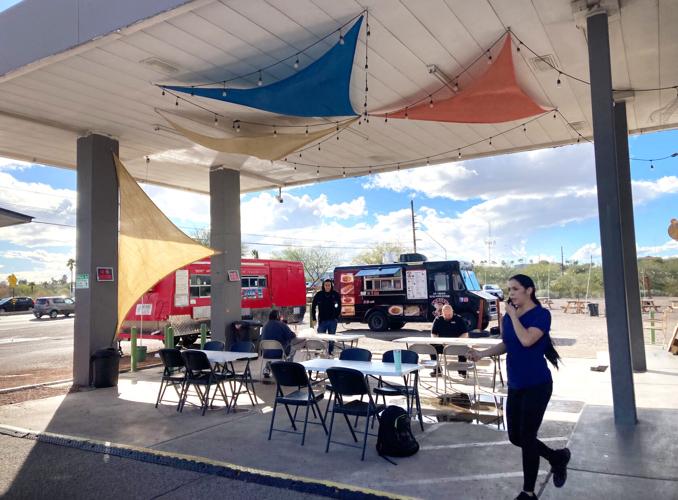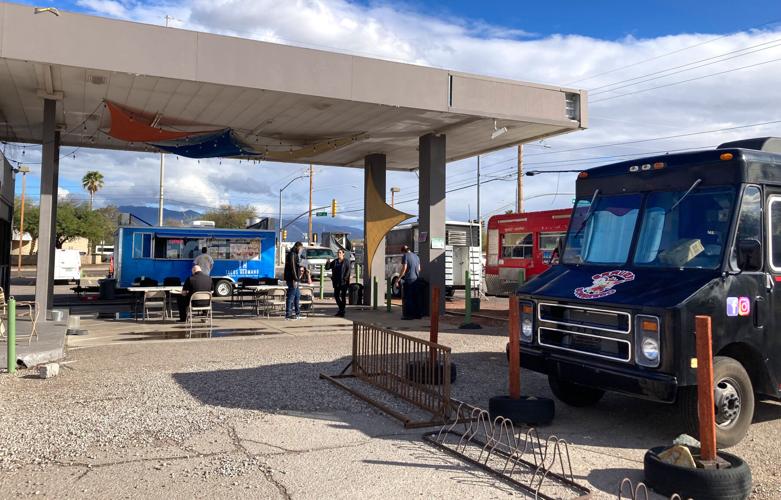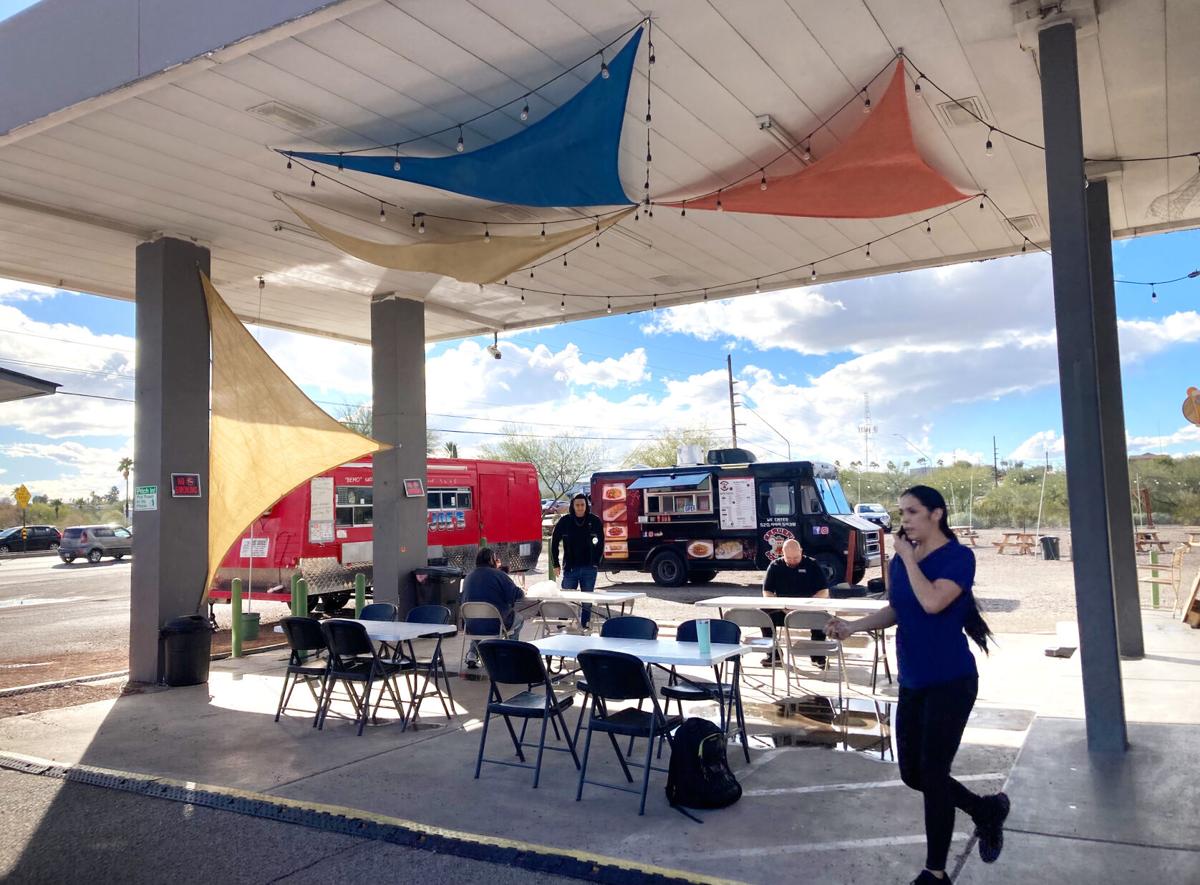The idea struck me as brilliant the minute we rolled up.
On a bike ride in November, some friends and I arrived at East 22nd Street and South Pantano Road. It was midday, and there they were, just off the Loop next to the Pantano Wash: a group of food trucks arrayed on the grounds of a former gas station.
Beer, soda and snacks were for sale inside the small store, and the few trucks open at that early hour served Jamaican, Mexican and Mediterranean food. I chose the Jamaican and sat outside at the tables, placed under the gas station canopy where people once filled their tanks.
This was my introduction to the concept of a “food-truck park,” a phenomenon popping up around the country. I’d never contemplated the possibility.
Unfortunately, neither do Tucson’s city codes.
Amber Donahue and Chris Frisch opened the place, known as The Pit, on March 25. It features not just the trucks and tables on the gas station site, but also picnic tables and games on adjacent land closer to the Loop.
Since August, though, they have been struggling to keep it open. That’s when city inspectors found problems that included the electrical setup, bathroom access and parking.
For months, they have been trying to get good with the city, filing a site plan and other documents, fixing this and that.
Whatever they did, though, the fundamental problem remained: City code prevents “peddlers,” which is what food-trucks are considered, from locating within 100 feet of each other.
At the Pit, there might be a half dozen peddlers within 100 feet. And that’s a good thing. That’s what made the place become popular right away — an unusual destination on the city’s southeast side.
“The real issue is, within the city limits of Tucson, there is no way to have a food-truck park,” Donahue told me. “Ultimately, I don’t believe the city doesn’t want to have something like this. There’s just no way to do it without changing that code.”
The Pit has been operating for months in a tenuous state, and the city rejected its site plan in December, deciding that it needs a “development plan,” which would be potentially cost-prohibitive. But the show went on.
On Jan. 8, a city inspector showed up with police officers in tow. It appears, according to city records, they were responding to a complaint of live music, alcohol drinking and dancing on site. They found nothing much.
“There was no music and had a stereo playing while on site,” the report from that date says. “Had a gentleman playing a guitar with an amp and had no dancing while on site. They do have kids from high schools that come at times and perform when asked. They have a store on site, and they do sell alcohol for to-go and not drink on the property.”
Still, The Pit was ordered to close.

The Pit is currently "operating on a temporary-use permit," City Council member Paul Cunningham said. "But we just can’t do that forever."
All this happened in the code enforcement division while other parts of the city apparatus were working to find a way to keep The Pit operating. Council member Paul Cunningham, whose ward the business is in, and the office of economic development were looking at city codes to see if changes could be made.
“The code enforcement department made a decision to suspend The Pit’s operation,” Cunningham said by text. “They did not contact me about the decision, which was disappointing, but it happens from time to time.”
When the hammer came down, the protests came quickly. The online publication Tucson Foodie and KGUN 9 ran stories about it. A petition started by Donahue gathered more than 3,000 signatures.
At 4:45 p.m. on the Friday before a three-day weekend, deputy city manager Tim Thomure, public information officer Andy Squire and Cunningham went to The Pit and met with Frisch and Donahue.
They hammered out a deal: The Pit can stay open for 45 more days, as long as it meets certain conditions. In the meantime, city officials will look at adjusting the code to allow for food-truck parks.
The conditions include:
No more than seven food trucks at the site.
A bathroom open to the public.
All trucks must show their health and fire inspections are up-to-date.
“They’re going to be operating on a temporary-use permit,” Cunningham said by phone Tuesday. “But we just can’t do that forever. We can’t keep approving special event permits.”
That means both sides need to show some agility. The city needs to find a way to quickly adopt new code allowing peddlers to group themselves together like this.
This shouldn’t be impossible: Food-truck yards exist in cities around the country, and another one, called Comida Park, is going up next to Tanque Verde Swap Meet, in the jurisdiction of Pima County.
“We don’t want to be nitpicky, but at the same time we want to be safe,” Cunningham said.
On the other side, Donahue, Frisch and the owners of the food trucks need to dig deep to adapt to the conditions the city imposes. Get the right electrical hook-ups and bathroom facilities, organize the parking.
This shouldn’t be impossible. Tucson should be a city that finds a way to help business people repurpose an abandoned property creatively, especially when they are bringing people together in a positive atmosphere like this.
Tucson Landmarks: With origins dating back to 1978, the Chuck Huckelberry Loop provides miles of paved walkways, art, views of plants and wildlife and a way to get around town. Video by Andrea Morabito for the Arizona Daily Star.
12+ Tucson restaurants we said goodbye to in 2022
Bentley's coffeehouse
Updated
Jo Schneider laughs for a photo with longtime friend Willow Bentley inside LaCo's courtyard, 201 N. Court Ave., on Jan. 12, 2022. Schneider and Bentley opened Bentley's House of Coffee and Tea 38 years ago. The cafe permanently closed its doors in December.
Tucson entered the new year without the longtime Bentley's coffeehouse, which closed in late December 2021 after nearly four decades in business.
With Bentley’s closed, the Schneider family and their community can still be found at the downtown restaurants LaCo and TallBoys.
Jo Schneider founded Bentley's so she could have and raise her sons, Ben and Eli, in a safe space, filled with community. She made that space home for generations of Tucsonans. The Schneider family can still be found at its downtown restaurants LaCo and TallBoys.
Wings Over Broadway
Updated
Wings Over Broadway, 5004 E. Broadway - Courtesy of Google earth
Wings Over Broadway announced the official closure of its restaurant at 8838 E. Broadway Blvd. in early October.
First opened in 1999, the restaurant moved into that most recent space from its original location at 5004 E. Broadway Blvd. in 2017. In a Facebook post, challenges WOB faced due to the COVID-19 pandemic and lengthy roadwork on Broadway were credited for the decision to cease operations.
Sullivan's Eatery & Creamery
Updated
Autumn Hand laughs along with regular customers as she takes their orders at Sullivan’s Eatery & Creamery, 6444 N. Oracle Road.
After 45 years, Sullivan’s Eatery & Creamery at 6444 N. Oracle Road will close for good.
Alex Mustaffa, who has owned the restaurant since 2017, said he will close no later than June 15, two weeks before his lease expires. But the closing could come sooner, he said, if he runs out of supplies or doesn’t have enough employees to keep the doors open.
1702
Updated
Eric Lepie, owner of 1702 Pizza and Craft Beer, is closing after 15 years in business.
1702 pizzeria closed its doors in May after 15 years of service. Not only will owner Eric Lepie be closing the restaurant but he’s also closing the final chapter of a 45-year restaurant career in Tucson.
Primo Italian restaurant
Updated
Primo at the JW Marriott Starr Pass Resort & Spa will close on Sept. 30. A new Italian trattoria-style restaurant will take its place in October.
After 18 years, two-time James Beard Award-winning chef and restaurateur Melissa Kelly is closing her Primo Italian restaurant at the JW Marriott Starr Pass Resort & Spa.
But Italian food is not leaving the west-side Tucson resort entirely.
Sometime in mid-October, Starr Pass, at 3800 W. Starr Pass Blvd., will replace the upscale Primo with a more casual trattoria.
Pizza Luna
Updated
Pizza Luna's sausage rossa pizza, $12.75, features wild mushrooms and housemade Italian sausage.
Pizza Luna owners Marc and Tracy Frankel closed their doors after five years of bringing Neapolitan-style pizza to the east side.
Last year, when the Frankels launched Bubbe’s Bagels with Becca Groff and Kyle Leuer, they tapped into an even deeper need. Unlike delicious, Neapolitan-style pizza, which can be found in other neighborhoods — downtown’s Anello, food trucks like Family Joint Pizzeria — east-coast-quality bagels could not be found anywhere else.
Tino's Pizza
Updated
Tino's Pizza is closing in early February after nearly four decades in business.
In early January, the family made the painful decision to close Tino’s Pizza, after over 35 years, at 6610 E. Tanque Verde Road on Wednesday, Feb. 2.
“It’s hard to let go,” said Morgan Chonis, the family’s spokeswoman. “It’s been amazing, and the community and love and outpouring of support has been unreal. But ultimately it came down to the family’s decision to retire my father’s legacy.”

Morgan Chonis: “If you went to high school around here, it was the rite of passage to work here. We have kids working here now whose parents worked here.”
Fat Noodle
Updated
Lead cook Albert Leyva tops the House Ramen bowl with sesame seeds at Fat Noodle ramen restaurant, 811 E. Wetmore Road, on October 11, 2018, in Tucson, AZ.
Fat Noodle closed its doors at 811 E. Wetmore Rd. on August 6. The ramen shop will now make its food truck their main focal point. Fat Noodle is entirely made from scratch, from the noodles to the stock.

The Fat Noodle bowl of House Ramen features sonoran wheat house noodles, chicken and pork shoyu broth, pork chashu, soft egg, enoki, green onions, Fat Noodle sauce, sesame seeds and crispy onions at Fat Noodle ramen restaurant, 811 E. Wetmore Road, on October 11, 2018, in Tucson.
For Fat Noodle, opening a brick-and-mortar has been nearly two years in the making.

The FN Burger at Fat Noodle ramen restaurant is a sesame ginger beef topped with lettuce, tomato, hoisin sauce and spicy mayo on a grilled ramen noodle bun at Fat Noodle ramen restaurant, 811 E. Wetmore Road, on October 11, 2018, in Tucson, AZ.
4 Seasons Restaurant
Updated4 Seasons Restaurant announced that the restaurant is permanently closing at 1423 W. Miracle Mile. "We have provided high quality Thai food for 9 years and been an enthusiastic part of the local community," they wrote.
Donut Wheel
Updated
Sam Phetdara, owner, puts finished chocolate topped filling donuts on a rack at Donut Wheel, 4801 S Campbell Ave. in Tucson, Ariz. on Oct. 11, 2022. Donut Wheel is closing its doors after 34 years.
Donut Wheel at 4801 S. Campbell Ave. closed its doors Oct. 28.
“It’s time,” said Sam Phetdara, who has operated the doughnut shop at Campbell Avenue and Irvington Road for 34 years. “Our customers are sad and say they are going to miss us.”

Baker Josh Gonzalez puts sprinkles on chocolate and pink frosted donuts at Donut Wheel.
For Star subscribers: The two Donut Wheel locations are owned and operated separately. One will close at the end of the month and the other has already shut its doors.
Sonoran Brunch Company
Updated
This colorful mural where brunch foods rain down was created by Cactus Clouds Art. Find it at Sonoran Brunch Company in the drive-thru.
The Sonoran Brunch Company opened in 2019 near Kolb Road and 22nd Street. It featured colorful murals and breakfast foods.
Sonoran Brunch Company closed in May.
Eegees Grant & Alvernon
Updated
Any local is going to tell you to do this right away. Why? They're amazing and no one else has them. You can also take your eegee's drink to the next level with our simple tricks.
There are two near campus: Speedway Boulevard and Tucson Boulevard, 2510 E. Speedway Blvd. AND Grant and Campbell, 2470 N. Campbell Ave.
Eegee's at Grant and Alvernon closed its doors Nov. 29. The popular Tucson sandwich and shaved ice restaurant has nearby locations at Speedway and Tucson, Speedway and Craycroft or Campbell and Grant.
Mantis Gourmet Chinese Food
UpdatedMantis Gourmet Chinese Food will permanently close its doors at 8250 N. Cortaro Rd. on Dec. 31. The restaurant is one of several located in the Arizona Pavilions Marketplace.








